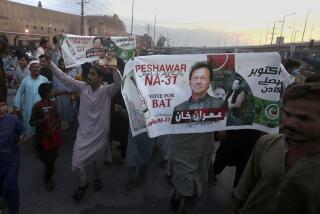Conflict brews between Pakistani president, Supreme Court
- Share via
Reporting from Islamabad, Pakistan — President Asif Ali Zardari’s beleaguered administration and the country’s powerful judiciary could be on a collision course, as the nation’s Supreme Court warned Friday that any government plan to fire the high court’s judges would amount to treason.
Chief Justice Iftikhar Mohammed Chaudhry’s remarks appeared aimed at preempting what he and the rest of the high court perceived as a potential move by Zardari and his prime minister, Yousuf Raza Gilani, to oust them before they could rule on whether presidential immunity shielded Zardari from an old money laundering case in a Swiss court.
Gilani and Information Minister Qamar Zaman Kaira have vehemently denied news reports that they have moved to fire the judges, calling such stories “baseless rumor.”
Chaudhry acknowledged that the court was basing its concerns on Pakistani television reports that the government was considering a plan to rescind the March 2009 restoration of Chaudhry and other Supreme Court justices who had been fired by former military ruler Pervez Musharraf in 2007.
Although the news reports did not identify sources and their accuracy remained in question, they sent shockwaves through the high court and legal circles. In 2009, Pakistani lawyers led large protests that forced Zardari to restore Chaudhry to the bench.
After the news reports aired Thursday night, Chaudhry summoned other Supreme Court justices around midnight to discuss the matter. Then, at a hearing Friday, he ordered the government to submit in writing an assurance that it was not seeking the dismissal of high court judges.
Chaudhry requested that the assurance be signed by Gilani, and also ordered the government to track down the source of the news reports. Chaudhry made clear his doubts about the government’s denials. “This news is not false,” he told Atty. Gen. Maulvi Anwarul Haq, who represented the government at the hearing Friday.
The new drama is the latest chapter in a longstanding feud that dates to the early days of Zardari’s presidency, when he initially balked at reinstating the popular Chaudhry as chief justice, reportedly fearing that he would allow old corruption charges against him to proceed.
Those charges continue to cast a shadow on Zardari’s relationship with the court. The cases in Switzerland stem from Zardari’s conviction in absentia in 2003 in Geneva on money-laundering charges. The case was suspended while he and his late wife, former Prime Minister Benazir Bhutto, appealed, and was later dropped at the request of the Pakistani government in 2008.
Most experts agree that as president, Zardari enjoys constitutional immunity from prosecution. He was also protected by an amnesty law enacted by Musharraf in 2007 and aimed at allowing Zardari and Bhutto to return from self-imposed exile to Pakistan without fear of politically motivated prosecution. When Bhutto was assassinated in December 2007, Zardari took over as her party’s chief and was later elected president by the country’s national and provincial lawmakers.
Last year, the high court struck down the amnesty law. As a result, Chaudhry ordered the government to send a letter to the Swiss government requesting the reopening of corruption charges against the president. The Pakistani government has not complied, prompting accusations from Chaudhry that his ruling has been ignored by Zardari’s administration.
Zardari’s supporters have accused Chaudhry and the rest of the court of allowing political motives to color rulings related to the president. “It irks me as a lawyer that nonpolitical organs are carrying out politics,” Law Minister Babar Awan, a Zardari stalwart, said at a news conference Friday, apparently alluding to the Supreme Court.
The clash between Zardari and Chaudhry has the potential to erupt into a full-blown crisis that could undermine Pakistan’s stability at the worst time, as it rebuilds after catastrophic summer floods and is being relied on by Washington as a key player in the war against Islamist militants.
Outside the Supreme Court on Friday, lawyers chanting anti-Zardari slogans vowed to take action if they felt the government posed a threat to the high court.
“If need be, we will once again hit the streets of Pakistan,” said Qazi Anwar, president of the Supreme Court Bar Assn. “We will light such a fire that it will engulf even the rulers. The politicians should not test the nerves of this nation.”
Special correspondent Nasir Khan in Islamabad contributed to this report.
More to Read
Sign up for Essential California
The most important California stories and recommendations in your inbox every morning.
You may occasionally receive promotional content from the Los Angeles Times.













